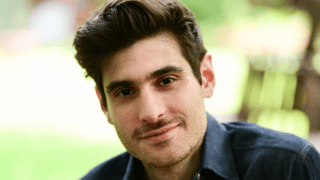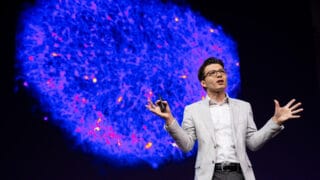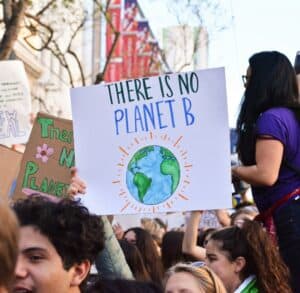The Lavin Agency Speakers Bureau
A speakers bureau that represents the best original thinkers,
writers, and doers for speaking engagements.
A speakers bureau that represents the best original thinkers,
writers, and doers for speaking engagements.
Wrestling through our climate change anxiety is the first step towards finding purpose, building resilience, and saving ourselves.
Our climate change anxieties have never been more overwhelming—but they’re also the key to saving the planet. Britt Wray shows us how to embrace our complicated, messy emotions about the climate crisis. Her revolutionary scientific research on the psychological toll of climate change, outlined in her brilliant book Generation Dread, reveals a surprising truth: that acknowledging and dealing with climate anxiety helps us find purpose, avoid burnout, and solve both mental health and ecological problems. She’s the Director of CIRCLE—a research and action initiative focused on Community-minded Interventions for Resilience, Climate Leadership and Emotional wellbeing—at the Stanford School of Medicine. Deeply compassionate, scientifically rigorous, and, above all, hopeful, Britt “helps us manifest something we all need nowadays: strength” (Adam McKay, director of Don’t Look Up).
“In this intriguing and engaging work, Britt Wray shows that addressing global climate change begins with attending to the climate within.”
—Dr. Gabor Maté, Bestselling Author of In The Realm of Hungry Ghosts
Britt Wray is a ground-breaking researcher and storyteller, and a growing voice around the mental health effects of climate change. She’s the Director of CIRCLE (Community-minded Interventions for Resilience, Climate Leadership and Emotional wellbeing) at Stanford Psychiatry in the Stanford School of Medicine. She draws on rigorous investigation and insightful interviews with therapists, activists and researchers to make the scientific case for embracing our climate crisis emotions—especially the ones we’d prefer to ignore. When we heal ourselves through community and open communication, we’ll be better equipped to heal the planet.
Britt’s acclaimed book Generation Dread, about finding purpose during the climate crisis, is an honest, profoundly compelling exploration of our climate-related stresses and “a road map out from under the burden of environmental chaos, made all the more compelling by the way it tracks her own journey” (Macleans). It was named a finalist for the 2022 Governor General’s Literary Awards. In Generation Dread, Britt takes a candid look at the many ways our “eco-distress” pushes us into a state of grief, numbness or fatalism, and how it makes us burn out and question big life decisions like whether to have children. But she doesn’t leave us in our anxiety. She reveals how the very grief that pains us can also mobilize and transform us, and how emphasizing support and community will help us protect our planet and its inhabitants. David Wallace-Wells, the New York Times bestselling author of The Uninhabitable Earth, calls Generation Dread “a marvelous exploration of the divergent, sometimes paradoxical, but always human ways in which we navigate the effects of climate change.”
She is the creator of the weekly climate newsletter “Gen Dread,” about staying sane in the climate crisis. A highly in-demand speaker, she’s given talks at TED and the World Economic Forum alongside the likes of Jane Goodall, Al Gore, Yuval Noah Harari, Johan Rockström, and Ban Ki Moon. As a science communicator, she has hosted several podcasts, radio and TV programs with the BBC, NPR, and CBC, and is a Chicago Council on Global Affairs Next Generation Climate Changemaker.
Britt is the recipient of the 2023 Canadian Eco-Hero Award and top award winner of the National Academies Eric and Wendy Schmidt Awards for Excellence in Science Communications, given by The National Academies of Sciences, Engineering, and Medicine. Her previous book, Rise of the Necrofauna, was described as a “must-read” by The Sunday Times, and The New Yorker called it one of the best books of the year. She has a PhD in Science Communication from the University of Copenhagen, and is an advisor to the Good Energy Project for climate storytelling and the Climate Mental Health Network.
We received very positive feedback about Britt’s engaging presentation. People found her presentation to be thought-provoking and interesting.
The Ottawa HospitalCEO of Trend Hunter New York Times bestselling author of Create the Future
Host of The Rick Mercer Report for 15 years Bestselling Author of Talking to Canadians and Rick Mercer Final Report Winner of the Stephen Leacock Medal for Humour
One of the world's top public intellectuals Author of Rationality, Enlightenment Now, and When Everyone Knows That Everyone Knows . . . Harvard Professor

Author, A Brief History of Intelligence AI Entrepreneur and Founder of Bluecore Forbes 30 Under 30 Honoree

New York Times Visionary in Medicine and Science Founding Director of Stanford Brain Organogenesis Knight of the Order of Merit
CEO of Phylagen, Inc. TED Senior Fellow
Bestselling author of The Uninhabitable Earth New York Times columnist
New York Times bestselling author of Here Comes the Sun, Falter, and The End of Nature Founder of 350.org and Third Act
Award-Winning Photographer Member of the TIME100 MacArthur Genius

#1 New York Times Bestselling Author of Grit and Situated | Pioneering Researcher on Grit, Perseverance, and the Science of Success

Nobel Prize Winner | 3rd Most Cited Economist in the World | Bestselling Co-Author of Why Nations Fail and Power and Progress

Harvard Business School Behavioral Science Professor | "40 Under 40 MBA Professor" | Author of TALK: The Science of Conversation and the Art of Being Ourselves

#1 New York Times Bestselling Co-Author of Abundance | Host of thePlain English Podcast | Founder of the Substack Derek Thompson

#1 New York Times Bestselling Author of How the Word Is Passed and Above Ground | The Atlantic Staff Writer
